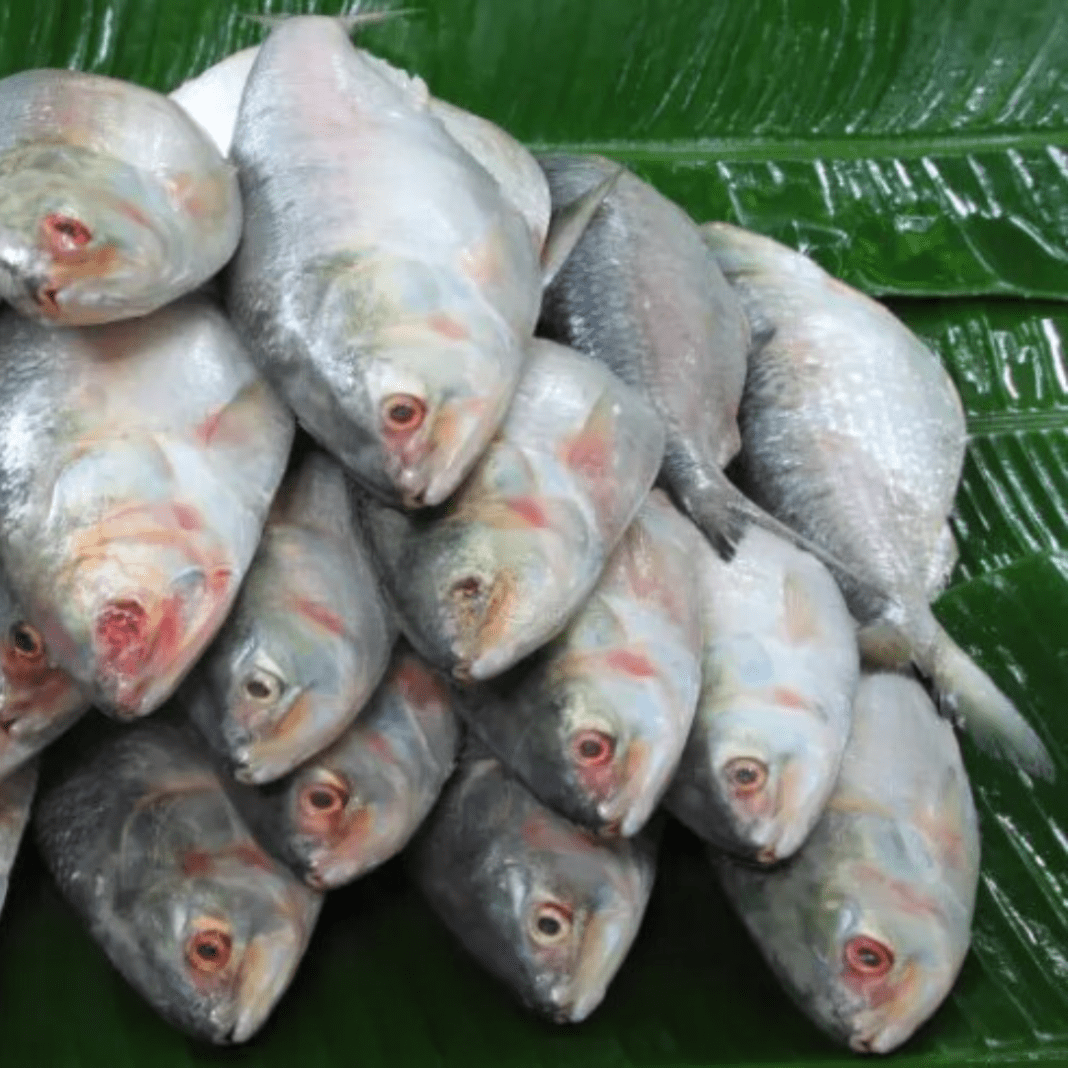The hilsa fish, locally known as “ilish” in Bangladesh and West Bengal, has long held the title of the queen of fish in the region. People cherish it for its vital role in the culinary and cultural identity of both Bangladesh and India’s West Bengal state. Cooks revere hilsa for its delicate flavor. They typically prepare it in mustard sauce. This dish is a popular choice during the Durga Puja festival. Durga Puja is one of the most significant Hindu festivals in West Bengal. However, the fish has come to represent more than just a culinary delicacy—it has evolved into a tool for diplomacy between India and Bangladesh. Recent tensions over exports of this fish highlight how deeply intertwined the fish is with the politics and trade dynamics of these neighboring nations.
The Importance of Hilsa in Bangladesh’s Economy and Culture
Hilsa holds significant importance in Bangladesh’s economy. The country exports 70 percent of the world’s hilsa, making it a key export product that supports the livelihoods of approximately 500,000 fishers and around two million people in related industries. Despite its economic contribution, hilsa has become an increasingly rare and expensive commodity. Overfishing, rising demand, and environmental challenges, including climate change, drive this scarcity. These factors significantly impact the availability of hilsa fish. Fishermen have reported reduced catches in recent years, exacerbated by rough sea conditions, further straining the availability of the fish.
In 2024, the price of a 1.5kg hilsa fish surged to $15 (1,800 Bangladeshi taka) in local markets, up from $10.9 (1,300 taka) in 2023, making the fish unaffordable for many Bangladeshis. The domestic shortage has sparked frustrations among consumers, with the government attempting to balance local demand against lucrative export opportunities.
Hilsa as a Diplomatic Tool
Former Bangladeshi Prime Minister Sheikh Hasina is credited with transforming hilsa into a diplomatic tool, using it to foster stronger ties with India. In the mid-1990s, shortly after coming to power, Hasina gifted hilsa to then-West Bengal Chief Minister Jyoti Basu, a move that helped facilitate a landmark water-sharing agreement between the two nations. Since then, hilsa has been used by Hasina’s administration as a gesture of goodwill toward India. In 2016, for instance, Hasina sent a consignment of hilsa to West Bengal Chief Minister Mamata Banerjee, further strengthening the relationship between Dhaka and Kolkata. The following year, hilsa was gifted to India’s then-President Pranab Mukherjee, a symbolic offering of friendship.
However, hilsa diplomacy has not been without its challenges. Bangladesh has periodically imposed bans on exports of this fish to India, particularly during periods of domestic shortage or when political tensions have risen. In 2012, disagreements over water-sharing agreements between the two nations led to the imposition of a ban. The authorities kept the embargo in place for several years. They lifted it in 2018 as a gesture of goodwill. Additionally, the Bangladeshi government enforces seasonal bans on hilsa fishing to protect the species during its breeding period, which typically occurs in October. While these measures aim to sustain hilsa populations, they often create economic hardships for fishermen who rely on hilsa for their livelihood.
The 2024 Hilsa Export Ban and Its Repercussions
In September 2024, Bangladesh’s interim government imposed a temporary ban on hilsa exports to India. They cited concerns over the declining population of the fish. The government also highlighted the need to prioritize domestic supply. This decision caused a stir in India. West Bengal was particularly affected, as hilsa is a highly sought-after delicacy during Durga Puja. Some experts viewed the move as a diplomatic snub to New Delhi. New Delhi had supported Hasina during her time in power. Hasina, who had taken refuge in India after being ousted in late August, had long used hilsa as a symbol of friendly relations with India.
The export ban marked a departure from Hasina’s policy, signaling a possible shift in Bangladesh’s foreign relations under the interim government. Some analysts interpreted the ban as a way for the new government to distance itself from Hasina’s pro-India stance. Farida Akhter serves as an adviser to Bangladesh’s Ministry of Fisheries and Livestock. She defended the ban on hilsa exports. Akhter stated that they cannot allow ilish to be exported. She emphasized that their own people cannot buy them.
Challenges of Hilsa Exports
Despite the initial decision to halt exports, the ban was short-lived. Following pressure from exporters and appeals from India’s Fish Importers Association, Bangladesh’s Commerce Ministry reversed the ban within weeks and approved a shipment of 3,000 tonnes of hilsa to India. While this move helped ease the culinary crisis in India, it failed to bring down hilsa prices in Bangladesh, where the fish remains out of reach for many due to its high cost.
The brief ban also underscored the economic and political complexities surrounding hilsa exports. The high demand for this fish in India, coupled with local shortages in Bangladesh, has created a delicate balancing act for Dhaka. On one hand, exports to India generate significant revenue; on the other hand, they contribute to the scarcity of the fish domestically. Additionally, some fishermen have been accused of smuggling hilsa to India, further driving up prices in Bangladesh.
The Future of India-Bangladesh Relations
The hilsa export ban and its reversal highlight the broader diplomatic tensions between India and Bangladesh. This fish has traditionally symbolized goodwill between India and Bangladesh. However, recent developments indicate a shift in this dynamic. The interim government in Bangladesh may adopt a more cautious approach to its relationship with India. This change is partly due to resentment among some Bangladeshis. They perceive New Delhi as having backed Hasina during her time in power.
The India-Bangladesh relationship is influenced by various factors beyond hilsa exports. Long-standing disputes over water-sharing agreements also play a significant role. Border security is another critical issue affecting their relations. Additionally, trade imbalances complicate the partnership between the two nations. Bangladesh wants a more equitable distribution of the river’s flow, and this is still a key source of disagreement in the Teesta River issue.
Despite these challenges, experts believe that India and Bangladesh can maintain a functional relationship due to their shared geography and economic interdependence. As both nations navigate their political transitions, the future of their relationship is in question. Their future will likely depend on finding common ground on key issues, including trade, security, and cultural diplomacy. The hilsa fish remains an enduring symbol of cross-border ties between the two countries.





